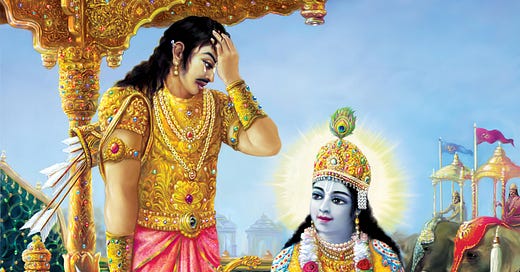Arjuna feels compassion and fear (Bg 1.28 to 1.29)
Arjuna felt a mixture of emotions that led to different symptoms. Some were due to compassion, others to fear. Arjuna thus showed a complex mixture of contradictory symptoms
« The Song of God: An in-depth study of the Bhagavad-gītā (Volume 1)
Verse 28: arjuna uvāca
dṛṣṭvemam sva-janam kṛṣṇa, yuyutsum samupasthitam
sīdanti mama gātrāṇi, mukham ca pariśuṣyati
Arjuna said: My dear Kṛṣṇa, seeing my friends and relatives present before me in such a fighting spirit, I feel the limbs of my body quivering and my mouth drying up.
Verse 29: vepathuś ca śarīre me, roma-harṣaś ca jāyate
gāṇḍīvam sramsate hastāt, tvak caiva paridahyate
My whole body is trembling, my hair is standing on end, my bow Gāṇḍīva is slipping from my hand, and my skin is burning.
Arjuna felt a mixture of emotions that led to different symptoms he describes in these two verses. In his commentary, Prabhupada explains that some of these symptoms, described in the first verse (the quivering of the body and the mouth drying up) were symptoms of compassion to the soldiers on the opposite side. Although it’s not directly described in the verse, we can also assume that he was crying out of compassion. Arjuna was naturally compassionate to the soldiers on his side since the beginning, but his compassion even for the soldiers on the opposite side is a symptom of being a pure devotee of the Lord.
Prabhupada quotes verse 5.18.12 of the Srimad Bhagavatam, yasyāsti bhaktir bhagavaty akiñcanā, sarvair guṇais tatra samāsate surāḥ. One who has unflinching devotional faith in the Supreme Lord and is engaged in His service automatically develops all the good qualities of the demigods. We can see a practical example in Arjuna.
According to Prabhupada, however, the symptoms described in verse 29 were due to fear. Arjuna was afraid to fight because he was afraid of losing his life in battle or making others lose their lives. As Prabhupada mentions: "There is no fear in transcendental realization. Arjuna’s symptoms in this situation are out of material fear – namely, loss of life."
Arjuna thus showed a complex mixture of contradictory symptoms that are described in these and the following verses. The state Arjuna had descended, the way he was overwhelmed by the situation, and his state of internal conflict and confusion serve as the stage for Krsna's instructions in the Bhagavad-gītā. Arjuna, the great hero of the Mahabharata was disturbed to the point of wanting to abandon the battlefield at the crucial moment. This highlights the seriousness of the situation and helps us to understand the impact and value of Krsna's teachings.
Main points in the purports of Srila Prabhupada:
“Arjuna said: My dear Kṛṣṇa, seeing my friends and relatives present before me in such a fighting spirit, I feel the limbs of my body quivering and my mouth drying up.”
a) Being a pure devotee of the Lord, Arjuna possessed all good qualities. His first reaction to seeing the soldiers on the other side was compassion. The sight of the whole community prepared to fight him overwhelmed a kind devotee like Arjuna. His limbs were quivering, his mouth drying up and he was crying out of compassion. These symptoms were not due to weakness but to a soft heart.
"My whole body is trembling, my hair is standing on end, my bow Gāṇḍīva is slipping from my hand, and my skin is burning."
a) The whole body quivering and hair standing on end, on the other hand, were symptoms of fear. Prabhupada explains that these two symptoms can also manifest out of great spiritual ecstasy, but that was not the case of Arjuna. It was because of fear of loss of life under a material conception of life. This is reinforced by his bow slipping from his hands and the burning sensation of the skin.
« The Song of God: An in-depth study of the Bhagavad-gītā (Volume 1)




